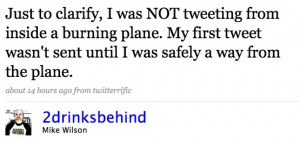The Telegraph proclaims Mike Wilson a ‘citizen journalist’ after quoting his Tweets sent from the scene of the plane crash at Denver International Airport.
Mike Wilson, a passenger on the plane, sent these Tweets after leaving the burning plane.
According to the Telegraph: “As the entire right side of the Boeing 737 burned, Mr Wilson shared his experience live with his family, friends, and an increasingly wide audience of strangers on Twitter.”
The headline reads ‘Citizen journalist sets the world a Twitter after Denver plane crash.’
Wilson used Twitter to communicate to family and friends in a public way, and then to document his appearances on the television news, but is this really an example of ‘citizen journalism?’ Or a public eye-witness account? Or is there no difference?

It’s difficult to decide a line between a witness who publishes an account of an event publicly and a journalist. Surely it is journalism in some way, but with no attempt to analyze the situation in an objective and truthful way. It’s likely that tweets and blog posts may be spawned from rumour (obviously not in the case of the plane crash) so this can’t be classed as journalism. That’s as much journalism as a couple of elderly ladies gossiping on a park bench.
Citizen journalism can however get somewhere where journalists might not be able to. This makes them an invaluable source to build up on a news story, rather than just treating the eye-witness account as a story. In the end it’s up to professional journalists to take a citizen story and follow it up to make it objective.
Pingback: Twitter and the citizen journalism argument (again) « Scribbles in my Notebook